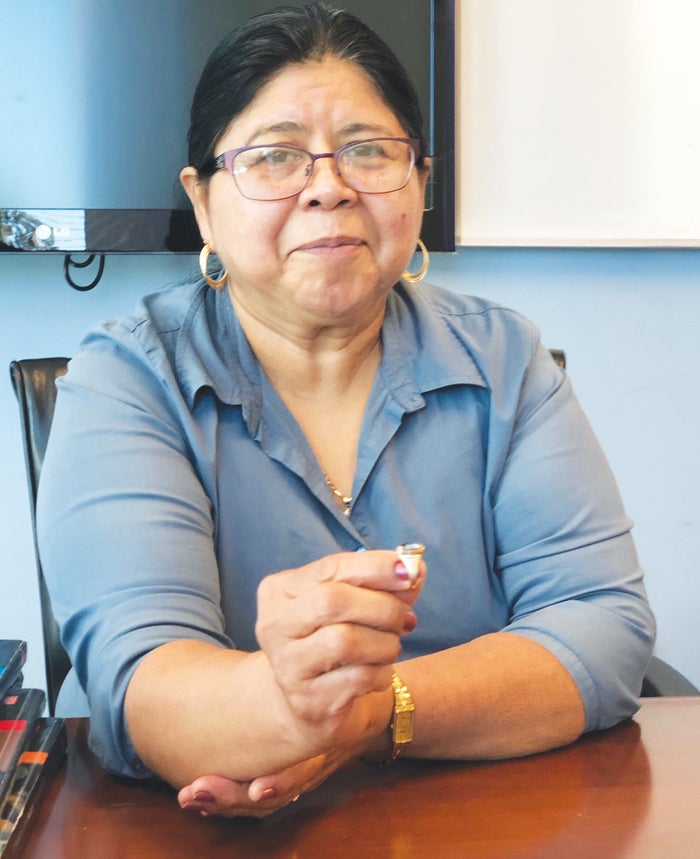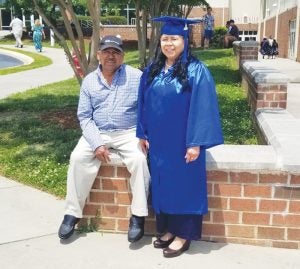El Salvador native pursues dream of earning GED
Published 12:00 am Thursday, October 10, 2019

- Matilde Mendez, a native of El Salvador, earned her GED on May 19 after 40 years in America and six years of study. Her daughter bought her a class ring.
By Maggie Blackwell
For the Salisbury Post
Matilde Mendez has a message for those who may not be able to read English: “Si tienes un sueno, lucha por el porque si se puede.”
It translates, “If you have a dream, fight for it, because you can do it.”
Mendez earned her GED on May 19 after 40 years in America and six years of study.
Mendez traveled by foot to the United States from El Salvador in 1979, when she was only 17. Her country was in the midst of a civil war, and life there was unsafe.
She walked through El Salvador, Guatamala and Mexico before reaching Brownsville, Texas – about 1,500 miles in all. She was too young to have identification, so her mother sent her with her sister’s papers.
“When I was in the middle of Mexico, I was crying,” she says. “I wanted to go back. I see the police. They hit us and say, ‘Give me your money.’ I gave the money, but I didn’t have much, just a little to buy food. They threw us on the ground and hit us. Finally, I got to Matamoro, the city that borders Brownsville. I crossed the river on a tire.”
Mendez was a domestic worker in Brownsville. She made only $12 a week, but it was better than at home, where jobs were scarce. After a short time, Mendez heard that jobs in Houston paid more money. So she and others walked to Houston, about 400 miles. There, she made $3.35 an hour.
After only three weeks in Houston, Mendez was approached by a man promising better work and higher wages in Florida. He drove her and others in a large van to work in orange groves.
“I am small,” she says, “and I couldn’t manage the big ladders to go up. I worked around the trees where it was mostly sand. I saw alligators in the lakes. Snakes would come down from the tree and look me in the face, their tongues flicking in and out of their mouth. I screamed.”
Mendez’s work brought her to North Carolina, where she picked tobacco and sweet potatoes; to Maryland, where she saw snow for the first time; to Ohio, where she picked tomatoes, apples and squash; and back to Florida to pick oranges.
In North Carolina, she didn’t mind picking tobacco in the fields, she says, but once it was cured, the smell was very strong. It gave her nightmares and made her vomit. When she explained to her superintendent, he said if she would start smoking, the smell wouldn’t bother her so much. Mendez wouldn’t smoke because it is unhealthy. So he allowed her to work only in the fields.
Her daughter Martha was born in Fremont, Ohio.
“When I was a little girl,” she says, “I asked my mother for a doll, even a very small doll, but there was no money. So when I was pregnant, I prayed for a girl, my own little doll. And my prayers were answered.”
Her brother came to the U.S. in 1981 at the height of the civil war. Their mother sent him to live with an aunt in another province, but he was wanted by both armies. If he went with the militia, Mendez says, the rebel forces would have killed him. If he had gone with the rebels, the militia would have killed him. So Mendez sent money for him to come here.
Her sister’s husband died in the civil war; she came to the U.S., leaving her two babies with her mother back in El Salvador. “When she sent for the girls,” Mendez says, “our mother said, ‘How am I going to send babies to the U.S.? You must bring us all or no one can come.’”
Mendez shrugs as she recalls all the siblings working two, even three jobs to raise the money for their mother, father, sisters, brothers and nieces to come to America. They were family, and you support family, she says.

Matilde Mendez, a native of El Salvador, earned her GED on May 19 after 40 years in America and six years of study.
Mendez and her siblings told her dad to sell the house, but he was stubborn, saying if he could ever go home, he needed a place to live. He never did sell the house but sold all their belongings to raise money for the trip to the U.S.
Mendez’s brother married an American and they were living in Washington. A church there had a network to help people seeking asylum. Someone would take them to a town and keep them there until another person came to take them farther north. They’d get so far and wait for someone else to take them even farther. They were fed and clothed.
“They were angels,” Mendez notes.
It took the family about three months to get from Matamoro, Mexico, to D.C.
“What a happy reunion it was,” Mendez recalled.
Once in the U.S., Mendez’s teenage sisters got jobs as nannies for two young children. They weren’t paid, she says, but they were provided housing and food, and they were allowed to go to school.
Their mother, father and two brothers went to live with a family in Howard County, Maryland. They cleaned stables, tended gardens and helped a veterinarian. The boys attended school.
Mendez’s father planted watermelon, tomatoes and other vegetables.
“The veterinarian’s mother was so happy,” she says, “it was the best tomato she ever had.”
Mendez is pretty proud of her father’s coping skills. When she was little, they would tell their father they were hungry. He would put an onion in the ashes of the fire and put it on a tortilla. It was all the food they had, but he prepared it with love.
“Vamos a comer,” he would say. “Come and eat.”
At other times, he would heat a tortilla and the children would pick lemons from a neighbor’s tree. They squeezed lemon juice on the tortilla and added salt.
Mendez’s father died last year at the age of 100.
He planned his funeral, including plenty of food so that all guests could eat well.
Mendez is proud that all her siblings have good jobs and have worked consistently at the same places for long periods. She has worked at Pass & Seymour Legrand in Concord for 22 years. She trains new people and places their material for them to work, checking their work when they’re done. She earned a promotion three years ago when she passed the “key words” test, attending Rowan-Cabarrus Community College to study.
Her graduation from the GED program at RCCC this May was a big deal for the family. Martha bought her mom a class ring so she could always remember the struggle and the success of school.
“She has been a constant inspiration,” Martha says. “She was my No. 1 supporter and cheerleader in nursing school – and it was really hard. She set a good example for me. No matter how hard it is, you can achieve your dreams and goals. I’ve gotten other degrees and she’s put herself there to help me and my kids – all while reaching her dreams. She’s always there to help in any way she can.”
“My dream was the GED,” Mendez says. “If you have a dream, fight for it, because you can do it.”
“Si tienes un sueno, lucha por el porque si se puedo.”




